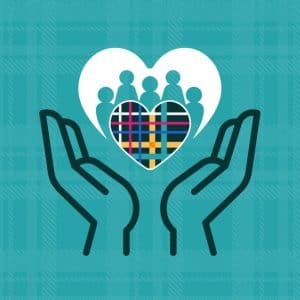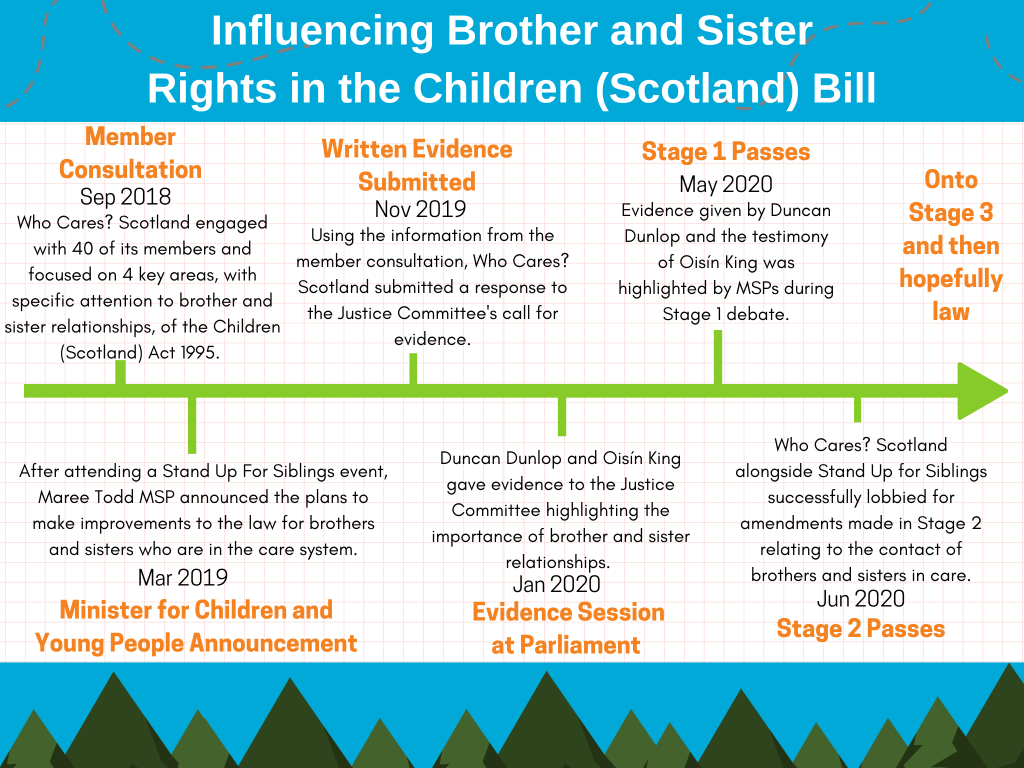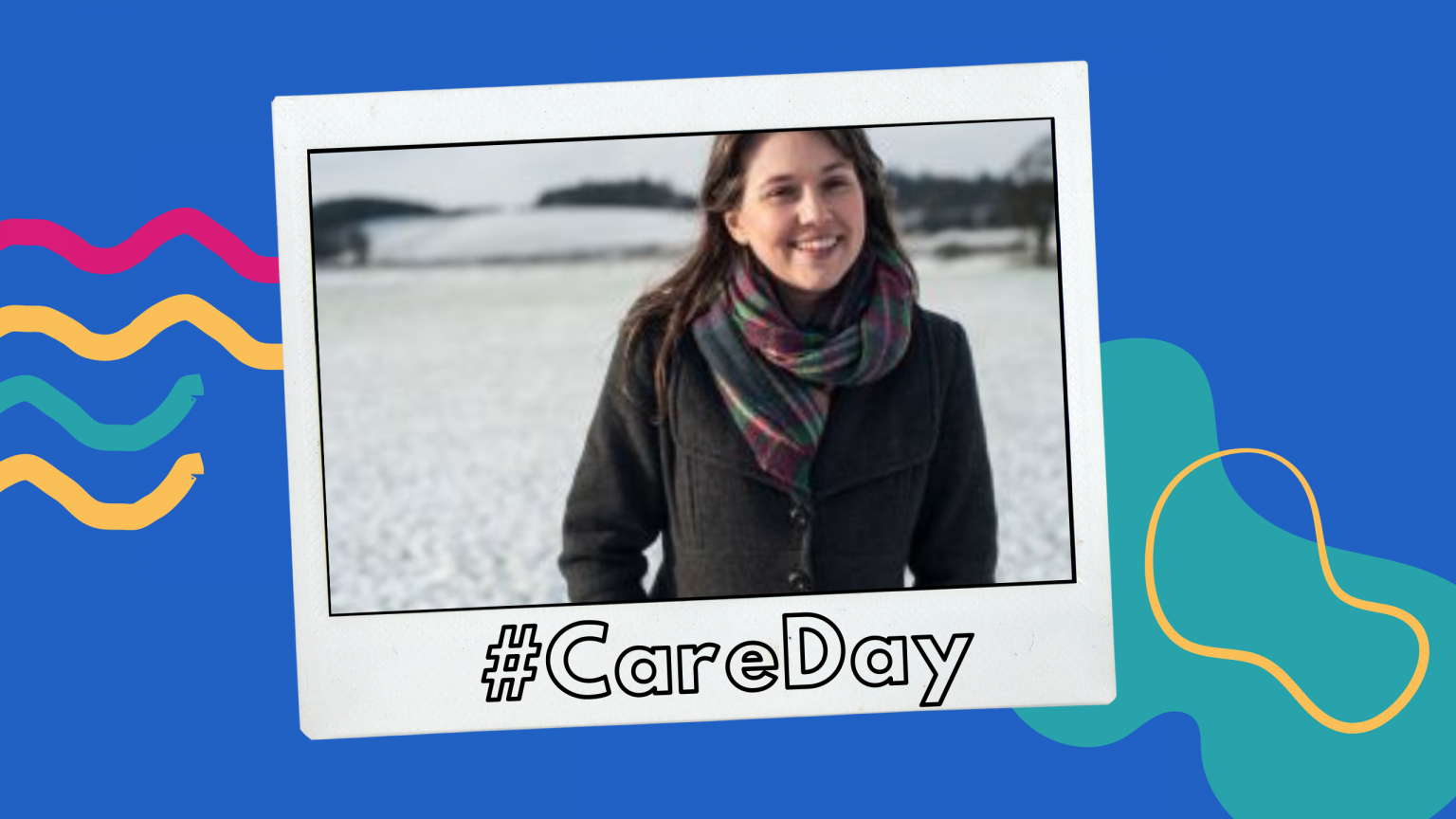Since March 2018, Who Cares? Scotland has worked alongside a variety of organisations to campaign for the rights of brothers and sisters in care to be protected in law.
The Stand Up For Siblings (SUFS) coalition raised the profile of an issue that Care Experienced people have told us about for decades. They want their relationships with their brothers and sisters to be protected.
We worked with SUFS to strengthen the sibling provisions during Stage 2 of the Children (Scotland) Bill by lobbying for change to section 10 of the Bill. Previously, it stated that a local authority will have a duty to
“…take such steps to promote, on a regular basis, personal relations and direct contact between the child and [their sibling where] both practicable and appropriate.”
Alongside SUFS, Who Cares? Scotland successfully asked for the term ‘practicable’ to be removed from this duty, better protecting facilitation of contact between brothers and sisters.
On 25th August 2020, the Bill was debated for the final time by MSPs at Stage 3 in the Scottish Parliament. Alongside SUFS, Who Cares? Scotland wrote to MSPs ahead of this final debate to urge them to support several more changes (called ‘amendments’) to the Bill.
These changes were successfully passed meaning there is now a more inclusive definition of who counts as a ‘sibling’. The changes also included adding a new way for people to participate in Children’s Hearings, creating a potential route for siblings to be part of their brother’s or sister’s Hearing, if it is in the best interests of the child.
Shaped by members’s voices
In January 2020, Who Cares? Scotland member Oisín King and our CEO Duncan Dunlop shared powerful evidence at an oral evidence session with the Justice Committee who were reviewing the Bill.
Oisín shared his experience of being separated from his sister, which made a significant impact on MSPs.
Duncan spoke of our advocacy evidence which shows concerns about how resource-led decision-making can lead to many sibling relationships being disrupted. He argued, alongside CELCIS, that ‘practicable’ should be removed from the Section 10 duty, as it allowed for resource-based decision making about sibling contact to remain unchallenged.
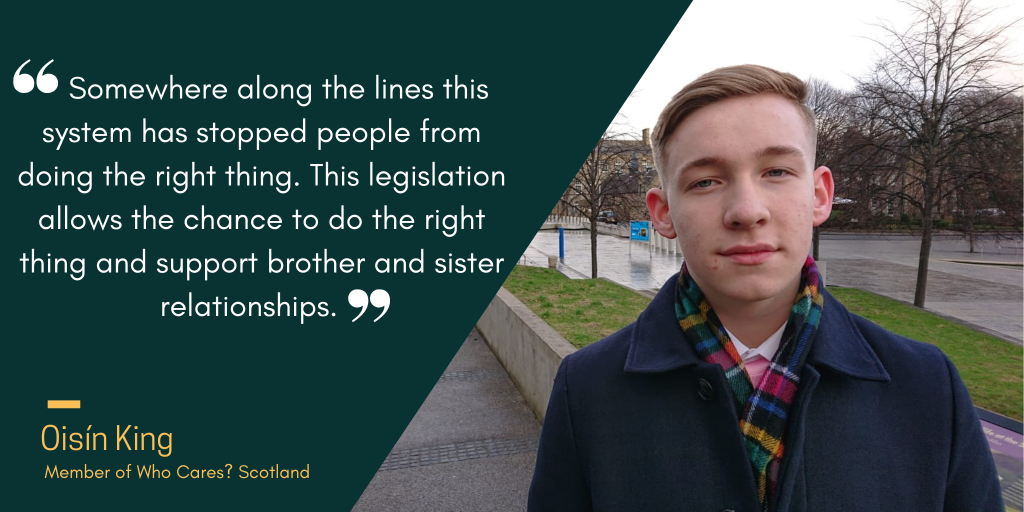
We also sent another important contribution directly to MSPs ahead of the oral evidence session – a special edition of the BBC ‘File on 4’ programme on sibling separation. This programme featured Who Cares? Scotland member Theighan McGirr and her sister Sophia speaking about their experiences of being separated. It further demonstrated to MSPs on the Justice Committee just how vital it is that the new sibling provisions in the Bill create real change for Care Experienced people.
During the Stage 1 debate of the Bill, MSPs from all parties cited Oisín’s evidence as proof of what can happen when the care system does not protect sibling relationships. This led to MSPs Neil Findlay and Liam Kerr to raise the issue of the word ‘practicable’ during the debate, as the Scottish Government had decided to keep the wording in at Stage 1 of the Bill. The evidence shared by Oisín continued to have impact throughout the Bill process, being cited again by MSPs in the Stage 3 debate in Scottish Parliament.
Working with Stand Up for Siblings (SUFS)
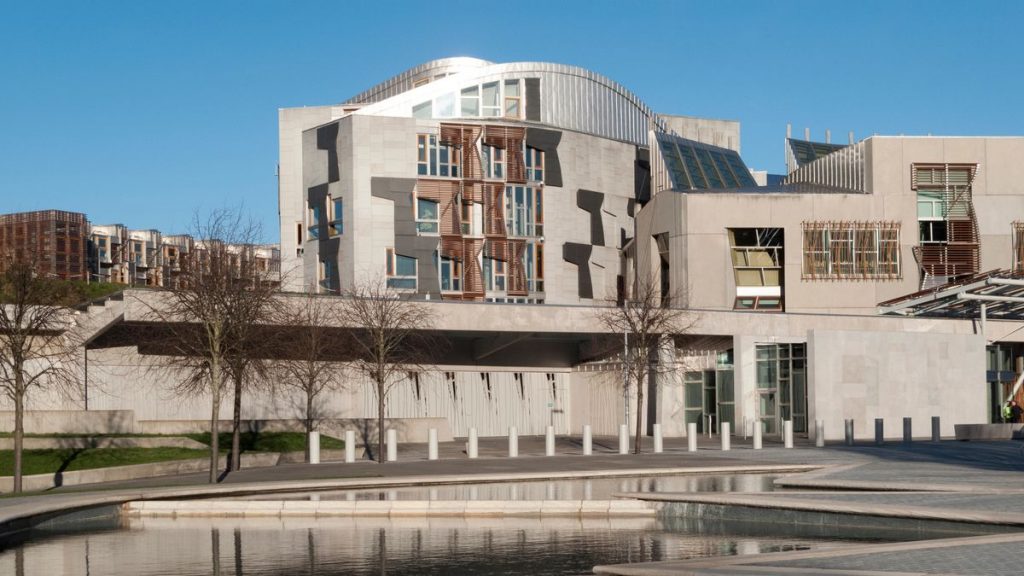
This success means the new duty on local authorities to promote sibling relationships is much stronger.
We then worked again with Stand Up For Siblings ahead of Stage 3 of the Bill and sent another joint briefing to MSPs outlining our support for a variety of final changes. This briefing also highlights some further issues that we want to see addressed when accompanying guidance is produced, such as:
- The importance of sibling relationships being defined from the perspective of the child.
- The need to take account of the changing nature of relationships.
- The importance of children’s needs and wishes being taken into account and regularly revisited.
- That the provisions in the Bill must apply equally to all looked after children, regardless of their legal status or type of placement including children for whom adoption or permanence is planned, or those already subject to Permanence Orders.
- That decisions about participation in Hearings centre first and foremost around the wants and needs of the child at the centre of the Hearing.
We are delighted the amendments we supported at this final stage were passed by MSPs. On 25th August 2020, the Children (Scotland) Bill passed into law, which marks a significant milestone for sibling rights.
The progress made at the various stages of the Bill is thanks to the incredible Care Experienced people that have shared their experiences of sibling separation with us, both publicly and through our advocacy relationships, for over 40 years.
A change in law is the first step and further work will need to be done to make sure Care Experienced people feel the benefit of this, including the creation of clear guidance on how this new law should be applied. Until these rights are realised in practice, we will continue to campaign for the rights of brothers and sisters in care.
Find out more
Who Cares? Scotland’s written responses:
- Who Cares? Scotland’s Response to the Review of Part 1 of the Children (Scotland) Act 1995 and creation of a Family Justice Modernisation Strategy – September 2018
- Who Cares? Scotland’s Response to the Justice Committee Call for Evidence on the Children (Scotland) Bill – November 2019
Members of Who Cares? Scotland sharing their experiences about being separated from their brothers and sisters:
- Who Cares? Scotland Blog – Twelve Years Separated: Theighan’s Experience of Sibling Separation
- BBC File on 4 Programme – Separated Siblings
- Who Cares? Scotland Blog – Being The Best Sister I Can, In Care
- SUFS News Item – Chloe and Danielle recognised at exciting awards ceremony
- SUFS Blog – Unbreakable Bonds
- WC?S Video – Dionne’s experience of sibling separation
- WC?S Young Radical’s Report on Sibling Separation and Contact
Information about the Children (Scotland) Bill process:



